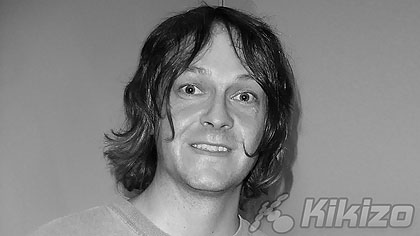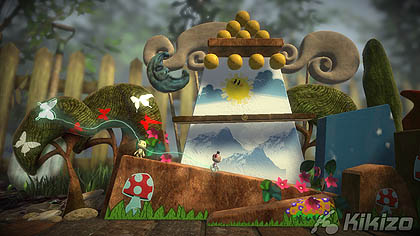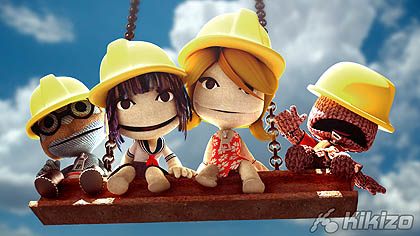LittleBigPlanet: The Very Big Interview
We talk to Media Molecule co-founders Mark Healey and Alex Evans, as well as Sony's Pete Smith, to get the FULL story behind the big PS3 game from a little British studio.

If you've been paying any attention over the past two months, you know that the world has gone absolutely crazy for LittleBigPlanet. Created by the 25-or-so developers at Guildford, UK-based Media Molecule, and soon to be expanded by the millions of PlayStation 3 owners around the world, the game has captured everyone's attention - adorning magazine covers and the pages of national newspapers. Gaming sites are being slowed to a crawl as eager players fight for the few thousand beta keys that have started leaking out. And behind the furor is a remarkable game that taps straight into the vein of new technology.
Among the lead characters in the LittleBigPlanet story is Mark Healey, Co-founder of Media Molecula. Healey started to make a name for himself with Rag Doll Kung Fu - a game he developed "sitting at my kitchen table in my pants", he tells us - while working alongside Peter Molyneux on Fable for the Xbox. Rag Doll Kung Fu was an exploration of game mechanics, allowing people to manipulate stylized marionettes with the mouse and act out fighting scenes in the style of popular Hong Kong action flicks. It was released on Steam and earned its creator awards and adoration.
After leaving Lionhead, Healey teamed up with Alex Evans, David Smith and Kareem Ettouney to form Media Molecule. The quartet picked up other developers coming off other successful projects, including Resistance: Fall of Man and Crackdown, and pitched Sony on a new game with big expectations. Set on a blue-and-green planet, LittleBigPlanet would provide players with a toolset allowing them to create living levels that they could share with their friends and anyone else with an internet connection. And to show players what the game was capable of, it would come with levels created by the team using the exact same tools that players would be able to use. "We have a mantra for the game which is Play, Create and Share, and we've put equal amounts of effort into each one of those," Healey says during an interview with Kikizo.
As an interesting aside, before pitching Sony, the ex-Lionhead company founders were working on a game "more Portally than Portal... Portal, but with scale factor", we're told. They went on to meet with Valve, which published Rag Doll Kung Fu on Steam. At the time, Valve also suggested that they work on a game together, but nothing came of that in the end. "We were very tempted," Evans reveals. "But in the end we decided to talk to Sony and they just got the game at the beginning."
Of the "three key pillars", as external Sony producer Pete Smith refers to them, 'Create' is the one that's getting all the attention. And for good reason. It's here that you'll exercise your creative muscle using intuitive tools that allow you to flaunt your imagination, creating everything from levels and objects within them to clothes for the lovable Sackboy. Healey says, like Sackboy's T-shirts, there will be a physical analogy to everything people create, to help players get a handle on this facet of the game as quickly as possible. You'll also be able to delve into your own life for raw material, grabbing images for background and objects from your hard drive or using the PlayStation Eye camera. "One of my personal ambitions is that I want to make this game easy enough for my mum to play, which is actually a very ambitious thing to say," he says.
As an example of the sort of integration with the PS3's feature set, Healey mentions that players will be able to work on levels together. User-friendly access rights management means that if you don't want someone messing with that jump you just made, you'll be able to mark it as verboten.
The breadth of choice is fantastic. We ask Alex Evans, co-founder and technical director at Media Molecule, if there are things that users will not be able to create. "No, absolutely not. Well, apart from these pre-made objects, but these are all very much like little small components that you use to make more complex machines." The literal nuts and bolts that hold it all together are there when you start but other than a few other raw materials, the world is what you make of it.
Any restrictions imposed on players were there for the creative team too, says Pete Smith. "What we said to our level design department is that you're not allowed to cheat. Anything they want to build, they have to be able to build it the way you would build it. So the variety they get into the levels is constantly testing our own versatility. We have to eat our own medicine, if you like."








 Satoru Iwata Video Interview - the late Nintendo president spoke with Kikizo in 2004 as 'Nintendo Revolution' loomed.
Satoru Iwata Video Interview - the late Nintendo president spoke with Kikizo in 2004 as 'Nintendo Revolution' loomed. Kaz Hirai Video Interview - the first of Kikizo's interviews with the man who went on to become global head of Sony.
Kaz Hirai Video Interview - the first of Kikizo's interviews with the man who went on to become global head of Sony. Ed Fries Video Interview - one of Xbox's founders discusses an epic journey from Excel to Xbox.
Ed Fries Video Interview - one of Xbox's founders discusses an epic journey from Excel to Xbox. Yu Suzuki, the Kikizo Interview - we spend time with one of gaming's most revered creators.
Yu Suzuki, the Kikizo Interview - we spend time with one of gaming's most revered creators. Tetris - The Making of an Icon: Alexey Pajitnov and Henk Rogers reveal the fascinating story behind Tetris
Tetris - The Making of an Icon: Alexey Pajitnov and Henk Rogers reveal the fascinating story behind Tetris Rare founders, Chris and Tim Stamper - their only interview? Genuinely 'rare' sit down with founders of the legendary studio.
Rare founders, Chris and Tim Stamper - their only interview? Genuinely 'rare' sit down with founders of the legendary studio. The History of First-Person Shooters - a retrospective, from Maze War to Modern Warfare
The History of First-Person Shooters - a retrospective, from Maze War to Modern Warfare